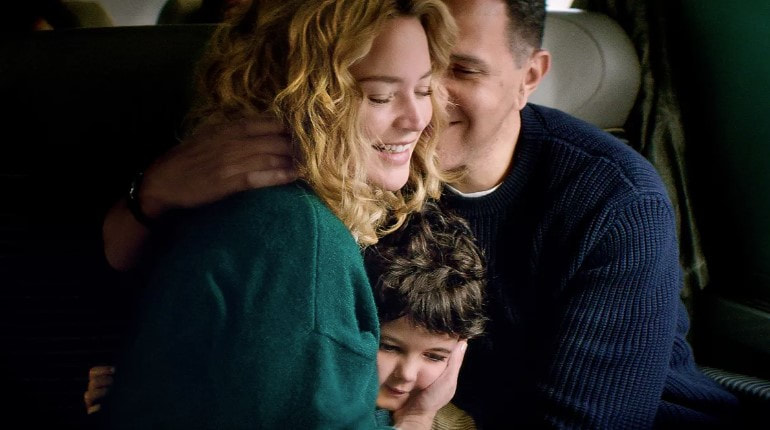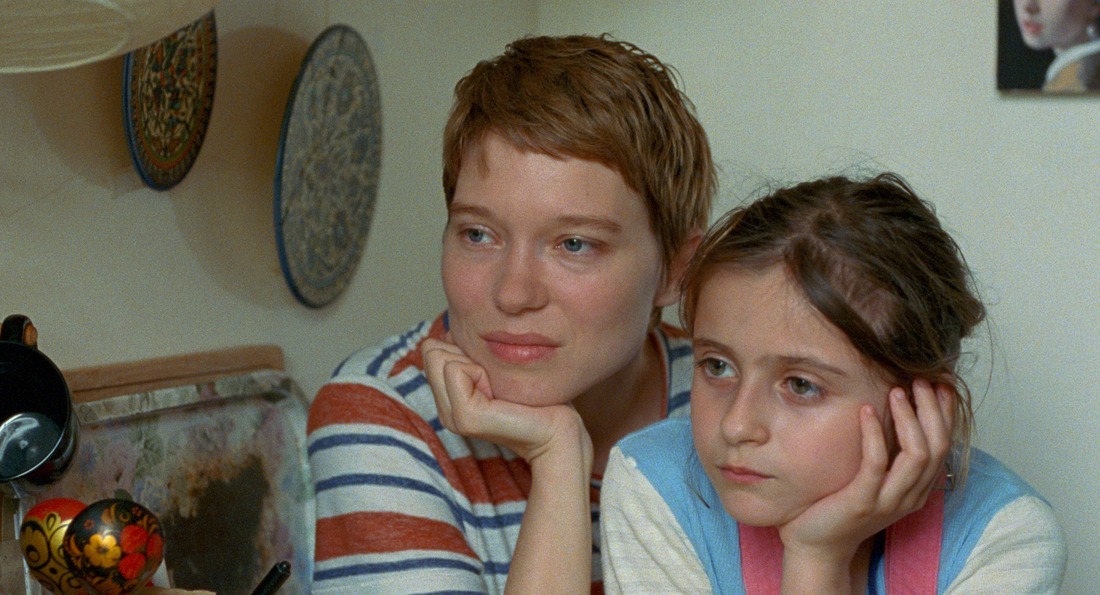After Hours Film Society Presents Other People's Children
July 10 | 7:30 pm
|
“Bittersweet and beautifully observed.”
–Variety “As complex as it is compassionate, 'Other People's Children' features standout performances, and no end of nuance. For the incurable romantic and cynic in equal measure, this film deserves to be seen by a big audience.” –Martin Carr | We’ve Got This Covered “This lovely French film captures the pain, joy, and longing of motherhood, whether you claim the title or not.” –Ann Hornaday | The Washington Post |

Reviewed by Ann Hornaday | The Washington Post
There’s a certain kind of French movie that’s a quintessentially French movie: stylish, intellectually engaged, alert to adult emotions and problems. “Other People’s Children” is that kind of movie — it tells a small-canvas story that loses none of its poignancy for refusing to overreach or give into fatal self-seriousness.
Rachel (Virginie Efira) is a 40-year-old Paris schoolteacher who, as the movie opens, is embarking on an affair with Ali (Roschdy Zem), a handsome automobile designer she’s met in guitar class. The two flirt and seduce each other and clearly have a healthy connection, but Ali is hesitant to introduce Rachel to his 4-year-old daughter, Leila. When the time is finally right, Rachel falls instantly in love, and understandably so. Played with winsome charm by Callie Ferreira-Goncalves, Leila is an enchanting child, even when she’s trying Rachel’s patience with distracting demands or telling her father, within earshot, that she wants his girlfriend to leave.
Following Rachel over roughly one year, “Other People’s Children” at first seems to be a blended-family parable — the tale of what might have been if Dustin Hoffman’s character had introduced his son to JoBeth Williams in “Kramer vs. Kramer.” But to its credit, this deceptively efficient but incisive portrait becomes something more, as Rachel grapples with whether she wants to become a mother (biological or surrogate), and what it means to make a meaningful difference in someone’s life, regardless of whether you claim the title.
Callie Ferreira-Goncalves, left, and Virginie Efira in “Other People’s Children.” (Music Box Films)
She explores the question by way of a few subplots, one featuring the documentary filmmaker Frederick Wiseman, cast as Rachel’s gynecologist in an amusing cinematic inside joke, and another one featuring a recalcitrant student who resists Rachel’s efforts to advocate on his behalf. When Rachel inevitably meets Leila’s mother, Alice (Chiara Mastroianni), the expected melodramatic sparks fail to ignite. Instead, she discovers someone who understands her position better than anyone, and the two form an ineffable but powerful bond.
Insightfully written and directed by Rebecca Zlotowski, “Other People’s Children” indulges in all the delicious tropes we’ve come to associate with European films of a certain vintage: long kisses on Metro steps, eye-catching skylines of Paris at night and an exceedingly attractive cast of players. Much like Renate Reinsve in “The Worst Person in the World,” Efira is compulsively watchable as a heroine whose conflicts are mostly interior: She’s beautiful in a natural, understated way that suggests she could be Carey Mulligan’s French cousine.
Like so many movies about women calibrating their desires, “Other People’s Children” doesn’t give Rachel everything she wants. Viewers might find themselves ambushed by a sadness that’s foreshadowed in the film’s first scene, when she explains to her students, after an interrupted screening of Roger Vadim’s “Les Liaisons Dangereuses,” that the story will end “badly, of course.”
“Other People’s Children” may not qualify as a tragedy, but for all its effortless pacing and surface sheen, it conveys two abiding — and, frankly, shattering — truths about love and loss, mortality, and the most confounding contradictions of time. “Life is both short and long,” Rachel wistfully notes to Dr. Wiseman. As “Other People’s Children” demonstrates, that’s both too bad and totally okay.
There’s a certain kind of French movie that’s a quintessentially French movie: stylish, intellectually engaged, alert to adult emotions and problems. “Other People’s Children” is that kind of movie — it tells a small-canvas story that loses none of its poignancy for refusing to overreach or give into fatal self-seriousness.
Rachel (Virginie Efira) is a 40-year-old Paris schoolteacher who, as the movie opens, is embarking on an affair with Ali (Roschdy Zem), a handsome automobile designer she’s met in guitar class. The two flirt and seduce each other and clearly have a healthy connection, but Ali is hesitant to introduce Rachel to his 4-year-old daughter, Leila. When the time is finally right, Rachel falls instantly in love, and understandably so. Played with winsome charm by Callie Ferreira-Goncalves, Leila is an enchanting child, even when she’s trying Rachel’s patience with distracting demands or telling her father, within earshot, that she wants his girlfriend to leave.
Following Rachel over roughly one year, “Other People’s Children” at first seems to be a blended-family parable — the tale of what might have been if Dustin Hoffman’s character had introduced his son to JoBeth Williams in “Kramer vs. Kramer.” But to its credit, this deceptively efficient but incisive portrait becomes something more, as Rachel grapples with whether she wants to become a mother (biological or surrogate), and what it means to make a meaningful difference in someone’s life, regardless of whether you claim the title.
Callie Ferreira-Goncalves, left, and Virginie Efira in “Other People’s Children.” (Music Box Films)
She explores the question by way of a few subplots, one featuring the documentary filmmaker Frederick Wiseman, cast as Rachel’s gynecologist in an amusing cinematic inside joke, and another one featuring a recalcitrant student who resists Rachel’s efforts to advocate on his behalf. When Rachel inevitably meets Leila’s mother, Alice (Chiara Mastroianni), the expected melodramatic sparks fail to ignite. Instead, she discovers someone who understands her position better than anyone, and the two form an ineffable but powerful bond.
Insightfully written and directed by Rebecca Zlotowski, “Other People’s Children” indulges in all the delicious tropes we’ve come to associate with European films of a certain vintage: long kisses on Metro steps, eye-catching skylines of Paris at night and an exceedingly attractive cast of players. Much like Renate Reinsve in “The Worst Person in the World,” Efira is compulsively watchable as a heroine whose conflicts are mostly interior: She’s beautiful in a natural, understated way that suggests she could be Carey Mulligan’s French cousine.
Like so many movies about women calibrating their desires, “Other People’s Children” doesn’t give Rachel everything she wants. Viewers might find themselves ambushed by a sadness that’s foreshadowed in the film’s first scene, when she explains to her students, after an interrupted screening of Roger Vadim’s “Les Liaisons Dangereuses,” that the story will end “badly, of course.”
“Other People’s Children” may not qualify as a tragedy, but for all its effortless pacing and surface sheen, it conveys two abiding — and, frankly, shattering — truths about love and loss, mortality, and the most confounding contradictions of time. “Life is both short and long,” Rachel wistfully notes to Dr. Wiseman. As “Other People’s Children” demonstrates, that’s both too bad and totally okay.
DISCUSSION FOLLOWS EVERY FILM!
$7.00 Members | $11.00 Non-Members
TIVOLI THEATRE
5021 Highland Avenue | Downers Grove, IL
630-968-0219 | classiccinemas.com
We apologize—Movie Pass cannot be used for AHFS programs
$7.00 Members | $11.00 Non-Members
TIVOLI THEATRE
5021 Highland Avenue | Downers Grove, IL
630-968-0219 | classiccinemas.com
We apologize—Movie Pass cannot be used for AHFS programs








